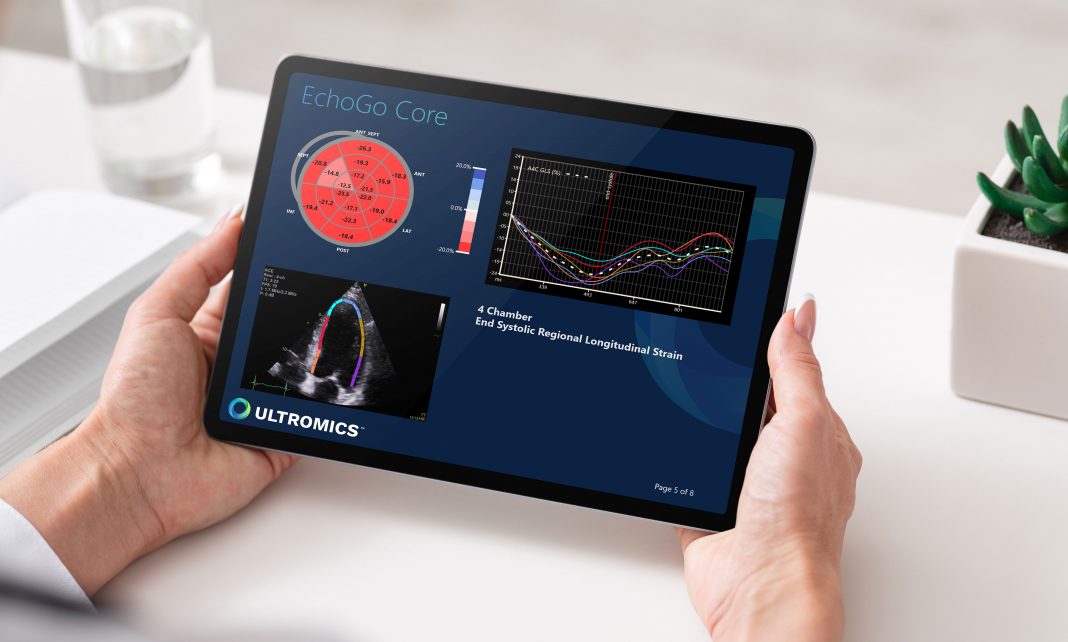Ultromics to Use Funding to Accelerate Use of AI-Enabled Echocardiograms
Ultromics is a leader in AI enabled cardiovascular imaging solutions. Today the company announced it has raised $33 million in a Series B funding round. The round was led by the Blue Venture Fund with participation from Optum Ventures, GV, and existing investor Oxford Sciences Innovation.
Ultromics will use the new funding to help accelerate the use of AI-enabled echocardiograms to help improve patient care, and bring improved diagnostic quality and resource savings to hospitals. (Cardiovascular disease is the leading cause of mortality in the world, with an estimated 17 million deaths each year).
“Echocardiograms uploaded to the cloud and analyzed by artificial intelligence are set to revolutionize cardiac disease treatment pathways by helping more people understand their risk of heart disease earlier and with greater accuracy,” said Dr. Ross Upton, CEO and co-founder of Ultromics. “This funding with leading U.S.-affiliated venture capital funds will allow Ultromics to dramatically accelerate the use of AI-enhanced Echo into studies that currently use more expensive and less accurate imaging techniques.”
Founded in 2017, Ultromics’ EchoGo Core and EchoGo Pro platforms quickly deliver highly accurate assessments of heart function that support the diagnosis of coronary artery disease, heart failure and amyloidosis. Both were spun out of the University of Oxford and built-in partnership with the U.K.’s National Health Service (NHS). Oxford Sciences Innovation, an organization that helps scientific breakthroughs become world-changing businesses, helped get Ultromics’ business off the ground, and doubled down on its support of Ultromics during the Series B funding round.
EchoGo Core and EchoGo Pro are already being used and validated by several organizations, including Mayo Clinic and the Oregon Health and Science University. EchoGo Core was recently featured in groundbreaking research that showed Ultromics’ AI-generated echocardiography analysis could provide meaningful predictors of health outcomes, where manual analysis did not.
Blue Venture Fund – a unique collaboration among Blue Cross Blue Shield (BCBS) companies, the Blue Cross Blue Shield Association, and Sandbox – to which 35 BCBS companies have committed over $890 million across four funds, led the Series B round to help accelerate adoption of AI-enabled echocardiograms and address impact of cardiovascular disease on Americans.
“Cardiovascular disease is the leading cause of morbidity and mortality in the United States, and Ultromics offers groundbreaking AI solutions for more accurate diagnosis,” said Dr. Emir Sandhu, Managing Director at the Blue Venture Fund. “We are excited to partner with Dr. Ross Upton and the Ultromics’ team, as they promote improved patient outcomes.”
“Ultromics’ software significantly improves the ability of clinicians to leverage low-cost ultrasound imaging to address cardiovascular disease, one of the greatest healthcare burdens of our generation” said Dr. Vijay Barathan, Optum Ventures. “We are thrilled to be supporting the Ultromics team in their mission to improve patient lives through AI enabled cardiovascular imaging solutions.”
“Echocardiography is the most accessible, lowest cost, least-invasive, safest and most convenient means of imaging the heart,” said Dr. Upton. “With Ultromics’ AI, we have proven that it can now be as accurate and effective as more expensive modalities that are not available to all patients. This trio of investors presents Ultromics with a unique opportunity to substantially scale our technology globally, so that more people can get the care they need and deserve earlier.
“This Series B funding round will propel our company forward to a place that transforms disease pathways and saves more lives.”
